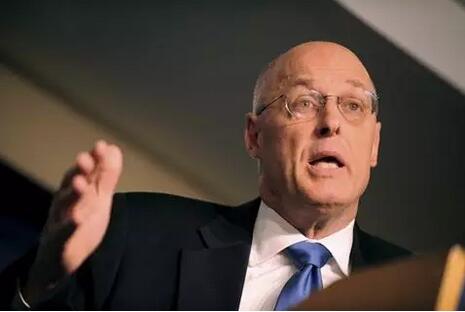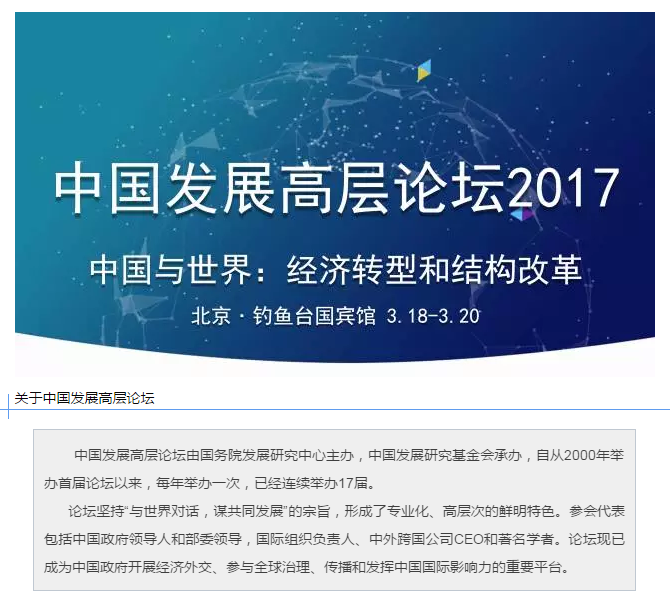亨利•保尔森:中国必须加快推进改革进程
"当然,目前中国正处在中共十九大召开前的政治敏感期,但我希望今后中国改革的步伐能够加快一些,开放的范围更大一些,换句话说,就是朝着“让市场发挥决定性作用”这个目标继续迈进。"
美国前财长保尔森(Henry M. Paulson, Jr.)应邀出席中国发展高层论坛2017年会,在论坛召开前夕,保尔森受中国发展研究基金会邀请分享了他关于中国改革的看法。以下内容登于中国发展研究基金会与中国高端媒体《财经》杂志联手,于2017年推出的《中国发展高层论坛论坛2017会前刊》内文。

美国前财政部长亨利·保尔森撰写的《与中国打交道》一书在中美政商界十分畅销,那些渴望深入了解对方的中美政要商界都将此书视为神会交往“门道”的秘笈。这本看似“高冷”的书却写的通俗、幽默,读来引人入胜。只有他这种经历的人才能描述出如此“隐秘”的细节,并抖落出鲜为人知的政要故事。
这位先后访华100多次,与中国高官打了近27年交道的大个子,在中国政商各界积累了深厚的人脉,很多中国人觉得除了亨利•基辛格(Henry Kissinger) 与中国渊源颇深外,保尔森无人能敌。他不仅在中美关系之间极尽斡旋,而且还热衷中国的环境治理、湿地保护和中国国家公园制度的推动等。
由于深度了解中国,他以旁观者清的姿态多次提出,中国应对短中长期困局,只有尽快推进全面的改革进程,真正实现让市场在资源配置中起“决定性”的作用,消除一直以来阻碍私营部门发展的监管障碍。保尔森在接受《财经》记者专访时坦言,“目前中国正处在中共十九大召开前的政治敏感期,但我希望今后中国改革的步伐能够加快一些,开放的范围更大一些——换句话说,就是朝着‘让市场发挥决定性作用 ’这个目标继续迈进。"
在保尔森看来,只有对阻滞中国经济活力的国有企业痛下狠手,进行更彻底的改革才能使中国经济爆发出内生的增长动力。“应该允许一部分国有企业倒闭,而不是通过惯用的企业合并,来解决亏损国企的问题。”
保尔森忙碌于工作之余,还是一位和善的观鸟者和环境保护者。他从上世纪90年代就开始和美国大自然保护协会一起在中国开展环境保护活动。他曾和妻子、女儿一道深入中国云南等偏远山区考察,为中国的环境治理出主意。
《财经》记者王延春/文

访谈实录
Caijing:In your book Dealing with China, you revealed many details regarding your dealings with China. As a China expert, what do you think about the possible future paths for China’s politics and economy?
Paulson:Firstly, China has undertaken a historic task to reboot its $11 trillion economy, attempting to transform it from an investment- and export-driven model to one that is based on services and consumption. That is no easy feat, especially at a time when China’s growth is slowing. President Xi Jinping’s commitment to giving the market the “decisive” role in the economy is encouraging, if and when it is fully implemented, because market-based competition and pricing will help drive that transition and spur healthier, more rational economic growth that will be sustainable in the long run.
And that is why, as someone who has long been involved in working with China’s leaders and business to help its economy make a successful transition, I am discouraged by the fact that there hasn’t been more economic reform or opening up over the last ten years. Clearly, we are in a political season in the run-up to the 19th Communist Party Congress, but I would like to see an acceleration of the pace and scope of reform and opening up—in other words, progress on the goal of giving the market a “decisive” role—in the period ahead.
Caijing:What advice do you have for future economic reforms?
Paulson:China is badly in need of deep and enduring structural reform. As I see it, China faces short-, medium-, and long-term challenges that are real and difficult: In the short run, the government faces a challenge from capital outflows and overcapacity in certain industries, both of which will exacerbate tensions with the United States if they lead to devaluation of the yuan or a perception that China is dumping steel or other industrial commodities into global markets.
In the medium term, China’s high level of debt is unsustainable, posing serious risks for firms and the economy. I see corporate and, to some extent, municipal debt as among the biggest challenges to China’s fiscal sustainability continued growth. As for the long run, China must find new growth drivers and make structural adjustments that will shift toward the new model I have just described.
A big part of the answer to all three of these challenges — short, medium, and long — is similar: Taking meaningful steps on the reform agenda would both increase market confidence in the near term and move China on the path to a new growth model for the longer term. In other words, China must double down on reforms, and soon.
Caijing:More specifically, what steps do you think China should take to reform the economy?
Paulson:Above all, China should show that it is serious about dealing with underperforming and inefficient state-owned enterprises. Another important step would be dramatically reducing overcapacity in sectors like steel and coal. China should allow some state-owned concerns to fail. Instead of dealing with them through the preferred tool of consolidation, China should instead allow some well-structured bankruptcies.
State owned enterprise reform will not be easy, but I believe it is vital because it would both demonstrate sensitivity to domestic and international market concerns and also move China down the path to the structural reforms needed for the long term. One very recent step that has encouraged me is President Xi’s push to deal with zombie firms. I read with interest his recent speech at a central leading group meeting calling for concerted action on this issue; that is the kind of tough challenge that China will need to meet across many areas of its economy.
Caijing:China and the U.S. have a new political and economic climate. For the past few years, China’s investment in the U.S. has risen greatly, contributing to local growth and jobs. But President Trump has repeatedly claimed that China is ‘stealing’ U.S. jobs and called for a 45% tariff on Chinese goods. How do you see the future of trade and investment relations between China and the U.S.?
Paulson:Clearly, it is time to make some adjustments in this evolving relationship that reflect changing economic and political realities.
For the United States, while our market is largely open to other countries’ exports, the market in China for our own most competitive exports remains too constricted. We simply have not seen the type of comprehensive market opening to U.S. goods and especially the participation of U.S. firms that we hoped and expected to see as part of China’s proposed reform agenda. The Trump Administration has made assuring fair competition and a level playing field one of its top priorities in trade.
In addition, while changing market conditions are slowing some U.S. investment into China, many U.S. firms are still eager to invest there but cannot. That is because sectors that are open to Chinese firms in the United States are closed to U.S. firms in China. And that has fueled political tension, even though Chinese outbound investment into the United States is a net positive that hit an all time high last year.
The Trump Administration is reviewing its policies regarding investment, and several potential changes to relevant legislation are making their way into the debate on Capitol Hill. Hopefully, any changes would apply broadly, not just be focused on China, but it is too soon to say whether that will be the case. Chinese efforts to open more sectors of its economy will, obviously, affect the scope and nature of that debate as calls grow louder to establish greater “reciprocity” in our investment policies. I am personally committed to promoting more trade and investment on a playing field that involves real competition. This is one of the reasons that I have worked so hard—both as Treasury Secretary and at the Paulson Institute—to promote investment, study lessons learned through Institute case studies, and continue to support efforts to conclude a bilateral investment treaty.
On the Chinese side of things, Beijing also needs to take actions that demonstrate a commitment to being more open and competitive. The 19th Party Congress will usher in important leadership changes that will affect the direction and speed of China’s reform efforts. I would like to see more progress on the agenda President Xi presented at the November 2013 3rd Plenum to allow the market to play a “decisive” role in the economy and resource allocation, modernize government, and, I hope, thus use his growing political authority to implement enduring and market-oriented economic reforms.
Caijing:What steps can be taken to help ensure stable U.S.-China trade relations?
Paulson:Concrete steps to further open China’s markets to foreign and domestic private sector competition would help persuade the American people that the U.S.-China relationship is based on meaningful and real competition, not government fiat. Market opening would also strengthen Chinese firms by exposing them to the competitive discipline of the marketplace and best in class global firms. In time, this will only increase their ability to compete successfully on the global stage.
As the U.S.-China relationship is stressed and tested in new ways, it is important that it not degenerate into debilitating competition, which would be harmful to both nations and the world. Thickening the economic relationship, not least by diversifying trade ties with a more diverse array of investment opportunities, would certainly help.
Caijing: You have been dealing with China for over 25 years and have a deep understanding of the country. What’s your view on the importance and potential of Sino-US cooperation in this new period? What are the new foci for bilateral cooperation? What do you think China should do to deal with the Trump administration?
Paulson:The relationship is always under stress, but it is heading for a period of greater tensions right now than we have experienced for some time, and so it is a good moment to step back and consider why a stable, constructive bilateral relationship would be good for both countries. As I’ve said, I believe the U.S.-China relationship is the most important bilateral relationship in the world. While the two nations are strategic and economic competitors, as the world’s two largest economies, both countries must still find ways to work together to tackle global security challenges, such as terrorism, while also working with an array of partners to help underpin sustained global economic growth.
Over the past several decades, the U.S. business community has provided support for a constructive U.S.-China relationship. But today, many U.S. businesses have the view that China’s business climate for foreign firms is deteriorating. The government is tightening controls, increasing supervision, protecting many sectors, and applying new rules and laws to commercial companies, including Americans, in ways that certainly affect U.S. operations and opportunities. Cyber theft of intellectual property from U.S. companies hurts especially. It erodes support for U.S.-China relations among U.S. business and makes them less willing to cooperate with China.
Historically, business has provided ballast to the U.S.-China relationship that has seen us through tough times, so the U.S. and China need to do things together that help ensure that continues to be the case.
Caijing:Are there areas for potential growth in the U.S.-China economic relationship?
Paulson: One promising area for business cooperation going forward lies in the search for new drivers of energy-efficient economic growth. The Paulson Institute’s CEO Council for Sustainable Urbanization brings together 19 leading CEOs from the United States and China to work on finding solutions for smart, resource-efficient urban development. The member companies are collaborating on projects that we hope will become models for businesses across China.
I also see the need for—and tremendous opportunity in—U.S.-China collaboration around creating new international financing mechanisms that will harness private capital for the resource-efficient businesses and projects that will be needed to drive economic growth going forward. The Paulson Institute has been working with the People’s Bank of China on developing a roadmap for an effective market for financing “green” projects. We have also played a non-commercial advisory role in the launch of the U.S.-China Building Energy Efficiency and Green Development Fund, which is a U.S.-China public private partnership.
The bottom line is this: financing the world’s transition to a low-carbon economy is costly—but we can’t afford not to do it. There is a huge need. China’s government has said that it can only finance 10% of the $1.6 trillion it will need to address pollution over the next five years. The United States and China—from businesses to governments—can work together to drive new engines for green growth.
Caijing: After your service at the U.S. Treasury, you founded the Paulson Institute to ‘advancing sustainable growth in the United States and China.’ What do you think the two countries should do to strengthen macroeconomic policy communication and coordination? Over the past few years, are there any changes in the way the two nations communicate?
Paulson: I have always believed that it is important to ensure regular, high-level candid dialogue between our two countries to avoid miscommunications and missteps. Building personal ties, I have found in my 20 years of experience in China, also helps in resolving complicated issues. When I was at Treasury, I established the Strategic Economic Dialogue to explore long-term solutions to some of our pressing economic issues. After leaving Treasury, I launched the Paulson Institute to serve as a not for profit focusing on supporting programs that provide a framework for continuing these types of dialogues—but in the private sector.
In the past few years, as our economies have grown and become increasingly interdependent, the importance of maintaining regular communication has increased. I believe that the new Administration in the United States recognizes this and will continue to have some type of high-level bilateral dialogue with China.
Caijing:Beyond your institute work, you are also a keen birdwatcher and an environmentalist. What’s your view on China’s smog, should we slow down the economy to protect the environment?
Paulson: I am a life-long conservationist—and I also believe in the importance of markets and economic growth. Indeed, I don’t think the two are contradictory. I believe that to have truly sustainable economic growth, you must have a healthy environment. I recognize, of course, that China faces a daunting short-term challenge, particularly as growth rates slow: how to keep the economy growing even as the country makes the transition to a more environmentally sustainable model.
It will take courage and foresight on the part of China’s leaders to take the necessary steps now for the sake of a healthy population, a healthy environment, and healthy economic growth in the long-term future. The transformation of the economy to a low-carbon model will pay off with new, clean growth in the future. There will be some economic disruption along the way. But doing nothing today will lead to far greater economic, political, and environmental disruption in the future.
While I recognize that China’s transition to a low-carbon economic model will not be easy, it is part and parcel of the broader transition underway to a more services and consumer driven economy. The Chinese leadership has stated that the break-neck rapid economic growth of the past several decades, based on state investment and exports, is no longer sustainable in the long run—from both an economic and an environmental point of view. The government’s commitment to an economic model that better balances economic growth with protection of natural capital, is encouraging. We hope to see its implementation as soon as possible.
转载请注明"转自‘中国发展高层论坛’
微信公众号DRC_CDF"





